牛津英语模块七第四单元所有知识点详解11
牛津深圳版七年级英语下册第4单元知识要点归纳总结
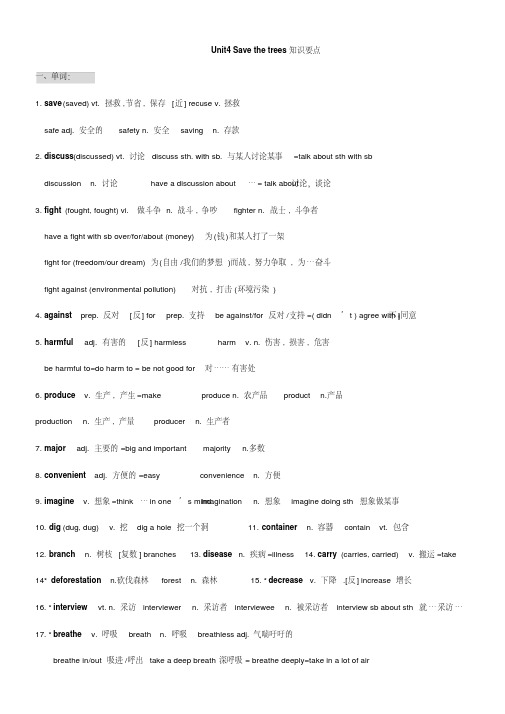
Unit4 Save the trees知识要点一、单词:1. save (saved) vt. 拯救,节省, 保存[近] recuse v. 拯救safe adj. 安全的safety n. 安全saving n. 存款2. discuss (discussed) vt. 讨论discuss sth. with sb. 与某人讨论某事=talk about sth with sb讨论,谈论discussion n. 讨论have a discussion about…= talk about3. fight (fought, fought) vi. 做斗争n. 战斗, 争吵fighter n. 战士, 斗争者have a fight with sb over/for/about (money) 为(钱)和某人打了一架fight for (freedom/our dream)为(自由/我们的梦想)而战, 努力争取, 为…奋斗fight against (environmental pollution) 对抗, 打击(环境污染)不)同意4. against prep. 反对[反] for prep. 支持be against/for 反对/支持=( didn’t ) agree with (5. harmful adj. 有害的[反] harmless harm v. n. 伤害, 损害, 危害be harmful to=do harm to = be not good for 对……有害处6. produce v. 生产, 产生=make produce n. 农产品product n.产品production n. 生产, 产量producer n. 生产者7. major adj. 主要的=big and important majority n.多数8. convenient adj. 方便的=easy convenience n. 方便imagination n. 想象imagine doing sth 想象做某事9. imagine v. 想象=think…in one’s mind10. dig (dug, dug) v. 挖dig a hole 挖一个洞11. container n. 容器contain vt. 包含12. branch n. 树枝[复数] branches 13. disease n. 疾病=illness 14. carry (carries, carried) v. 搬运=take 14* deforestation n.砍伐森林forest n. 森林15. *decrease v. 下降.[反] increase 增长16. *interview vt. n. 采访interviewer n. 采访者interviewee n. 被采访者interview sb about sth 就…采访…17. *breathe v. 呼吸breath n. 呼吸breathless adj. 气喘吁吁的breathe in/out 吸进/呼出take a deep breath 深呼吸= breathe deeply=take in a lot of air二、词组:1. take in 吸收=accept/absorb/breathe(in)2. come from 来自=被from3. look around 环顾四周4.(be) made of… 由…制成(能看出原材料) be made from…由…制成(不能看出原材料)5. (be) good for…对…有用, 有好处[反] be bad for…; be harmful to…对…有害6. try/do one’s best to do sth尽某人最大的努力做…7. cut down a tree 砍树8. be in danger 处于危险中9. destroy the area 破坏这个区域10. is home to …是…的发源地/家园/聚集地11. protect the environment 保护环境12. fight against air pollution 对抗空气污染13. get…from…从…中获得…14. answer the phone 接电话15. talk to sb. On the phone 和某人在电话里说话16. know (more) about…(更加)了解17. interview sb about sth 就…采访某人18. for example 例如=such as19. in fact (补充细节) 确切地说, 事实上, 实际上20. millions of…大量的, 数以百万计的21. in many ways 以很多种方法22. in our daily lives 在我们的日常生活中23. as a result 结果24. because of 因为25. according to…根据26. air/noise pollution 空气污染27. living things 生物28. provide sb with sth/ provide sth for sb 为某人提供某物三、句型结构:1. keep sth +adj. 使某物保持怎样的状态 e.g. keep the air cool and clean 保持空气凉爽和清洁2. make sb/sth. + adj.使某人… e.g. make our lives more convenient.使我们的生活更方便3. the number of… …的数量(+可数名词+谓语用单数) a number of… 许多(+可数名词+谓语用复数)四、重要句子:1. They keep the air cool and clean. 它们保持空气凉爽和清洁。
牛津高中英语模块七 Vocabulary(Grammar-Task)(共23张)
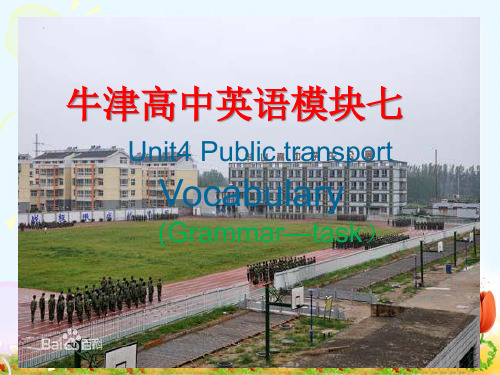
2)Heavy Metal music really arose in the late 60s.
重金属音乐真正形成于60年代后期。
3)These threats to health security arise from conflicts and natural disasters.
C. raising; bring down D. rising; brought down.
2. They’ve ______ up to 20,000 yuan for the Hope
Project.
A. rose
B. raise
C. raised
D. risen
3. When the question ______ at the meeting, no one
特地为他预留了一间带阳台的海景双人房。
②A nature reserve is an area of land where the animals, birds, and plants are officially protected.
自然保护区是指动物、鸟类和植物受到官方保 护的土地区域。
即学即用
7. We watched the waves c_r_a_sh_i_n_g(撞击) against the
1)吉姆大叔给孩子们带来了一大堆礼物。 Uncle Jim broughat _lo_a_d__o_f _/ _lo_apdrsesoef nts for the kids. 2)工人正在把木料装上卡车。 Men werelo_a_d_i_n_g_uap truck_w__it_h__ timber.
1)Salaries have now been raised. 现在薪水已增加了。 2)The price was raised to £10. 价格涨到十英镑。
牛津英语模块七第四单元重点单词及词组归纳1

Unit Revision Word List 1.underground/subway 2.distant 3.transport 4.carriage paratively 6.narrow 7.district 8.advanced 9.inconvenient 10.minister 地铁遥远的运输,运送车厢,四轮马车比较而言地,相对地窄的,狭窄的地区,行政区高级的,先进的不方便的部长,大臣11.effectively 12.horrible 13.damp/wet 14.gas 15.official 16.increase 17.coast 18.modest 19.airline 20.timetable 有效地可怕的,恐怖的潮湿的汽油,天然气,气体官员增加海岸,海滨谦虚的航线时间表21.port/harbour 22.cause 23.pedestrian 24.lorry 25.impatient 26.bicycle 27.pavement 28.tyre 29.invitation 30.fine 港口起因,事业,原因行人,步行者卡车不耐烦的自行车人行道轮胎诱因,请帖罚款31.assumption 32.irresponsible 33.overtake 34.overload 35.flyover 36.reliable 37.punctual 38.assignment 39.release 假定,意想不负责任的超过,赶上使超载立交桥,高架公路可靠的,可信赖的准时的,准点的分派的任务,布置的作业释放排放,发行发表周年纪念日40.anniversary 41.annoy 42.undertake 43.album 44.acquisition 45.distinction 46.vehicle 47.beneath 48.shuttle 49.boundary 50.departure 使生气承担,着手做相册,集邮册取得,获得,学到区别,声誉,名声车辆,交通工具在…下梭子,航天飞机边界,分界线离开,启程51.aggressive 52.alcoholic 53.orderly 54.dismiss 55.adminstration 56.sacrifice 好斗的,侵略性的,咄咄逼人的酒精的,含酒精的秩序井然的,有条理的解散、打发行政部门、管理牺牲、奉献Phrases 1.choke off 2.steam engine 3.in the middle of 4.go sightseeing 5.at a discount 6.in the hope that 7.take no notice of 8.make better use of 9.make up for 10.news flash 11.speed up 12.wash away 13.under repair 14.by ferry 15.in addition to 16.arise from 17.be aimed at 18.traffic jam 19.a couple of 20.pick up and drop off people 21.have the distinction of 22.the problem with traffic 23.the increased number of vehicles 24.the center of London 25.link up 26.a wealthy American businessman 27.be responsible for 28.be in use 29.increase people’s awareness of the problem30.travel on the underground 31.during World War II 32.accelerate the pace of 33.beneath the surface of the ground 34.in honour of 35. toll road 36.student ticket 37.customs officer 阻塞蒸汽机在…的中间观光,游览打折希望没注意到更好地利用弥补,补偿简明,新闻快讯加速冲掉,冲垮正在修理中乘轮渡除…之外,包括由…引起,起源于目的是,旨在交通拥堵,塞车两三个上下客有…的声誉交通问题不断增加了车辆伦敦市中心连接起来一位富裕的美国商人对…负责在使用中提高人们对问题的认识乘地铁旅游在二战期间加快…的步伐紧贴地表以下为了纪念收费公路学生月票海关官员38. cause damage to paratively narrow tunnels 40.beyond one’s modest expectations41.at (during) peak travel seasons 42.a public notice 43.Prime Minister 44.a closed station 45.an anti-aircraft center 46.function as 47.under the authority of 48.circle line 49.bomb shelter 50.May Day holiday 51.traffic accidents 52.pay attention to surrounding traffic 53.keep /be in good condition 54. take the advantage of 55.public transport 56.do one’s part57.run into a pedestrian 58.violate the traffic accidents 59.make dumplings 产生破坏相对狭窄的隧道超乎某人保守估计在旅游旺季公告首相,总理一个已关闭的地铁站一个反空袭中心起到…作用在…控制之下环线防空洞五一节交通事故注意周围的车辆状态良好利用公共交通贡献一份力量撞到一个行人违反交通规则包饺子1. drop off 让…下车让…下车(数量)减低,逐渐消失 2. choke off阻;阻止3. link up连接;会合4. function as用作5. accelerate the pace of 加快…的步伐6. go sightseeing 去观光去观光7. permit /allow sb. to do允许某人做某事8. at a discount打折9. rely on依赖,依靠10. end with以…结束11. in the hope of / in hops of 怀着…的希望;with the purpose of 带着…目的;for the purpose of 为了…目的with the intention of doing 12. take notice of注意到= take note of take notes of做笔记take no notice of 不注意;不理踩= ignore; pass by 13. make better use of = make the best of = make the most of 更好地利用make use of利用== take advantage of 14. make up for 补尝;弥补(recover sth. recover from) 15. news flash简明新闻16. wash away冲掉(走)17. under repair在修理中~ discussion在讨论中~ examination在考试中~ review 在复习中~ study在研究中~ consideration在考虑中~ construction在兴建中~ investigation在调查中~ control在控制中18. by ferry渡船by boat / by ship / by sea / by bike (plane; train; car; bus) 19. in addition to除…之外除…之外= apart from ; other than; except (for) 20. arise from 由……引起由……引起= result from; as a result of 21. be aimed at目的是be meant to do aim at sth.瞄准aim at doing sth.目的是/力争达到aim to be 立志成为立志成为22. traffic jam 交通堵塞;塞车交通堵塞;塞车23. a couple of 两个;两三个24. May day五一25. cause damage to 使……受到损害26. accelerate the pace of 加快27. in use 使用中使用中28. be powered by 由…提供能量. 29. the increased number of 急速增加的…数量30. lead to 导致导致31. it is decided that 决定32. beneath the surface 在地面下. 33. pull through 摆脱摆脱,度过难关. 34. under the authority of 在…的管理下. 35. In honor of 为记念…. 36. why not….? 为何不…. 37. travel cards 乘车卡防空避难所乘车卡. 38. bomb shelters 防空避难所。
牛津英语模块七 Unit4知识总结
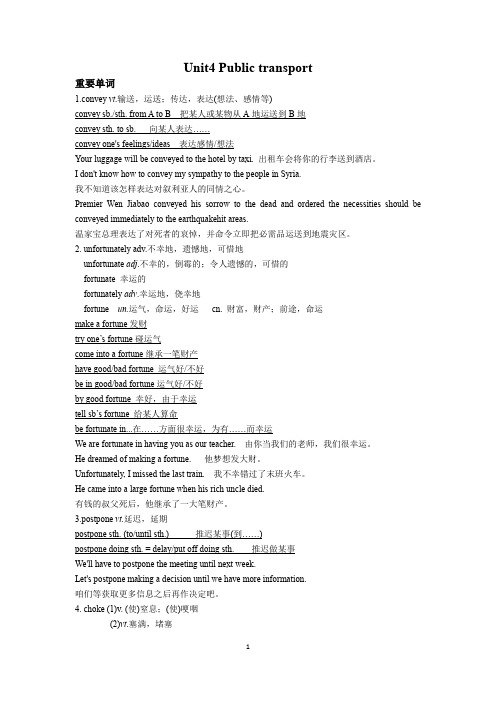
Unit4 Public transport重要单词1.convey vt.输送,运送;传达,表达(想法、感情等)convey sb./sth.from A to B把某人或某物从A地运送到B地convey sth. to sb. 向某人表达……convey one's feelings/ideas 表达感情/想法Your luggage will be conveyed to the hotel by taxi. 出租车会将你的行李送到酒店。
I don't know how to convey my sympathy to the people in Syria.我不知道该怎样表达对叙利亚人的同情之心。
Premier Wen Jiabao conveyed his sorrow to the dead and ordered the necessities should be conveyed immediately to the earthquakehit areas.温家宝总理表达了对死者的哀悼,并命令立即把必需品运送到地震灾区。
2. unfortunately adv.不幸地,遗憾地,可惜地unfortunate adj.不幸的,倒霉的;令人遗憾的,可惜的fortunate 幸运的fortunately adv.幸运地,侥幸地fortune un.运气,命运,好运cn. 财富,财产;前途,命运make a fortune发财try one’s fortune碰运气come into a fortune继承一笔财产have good/bad fortune 运气好/不好be in good/bad fortune运气好/不好by good fortune 幸好,由于幸运tell sb’s fortune 给某人算命be fortunate in...在……方面很幸运,为有……而幸运We are fortunate in having you as our teacher. 由你当我们的老师,我们很幸运。
牛津英语7bunit4知识点梳理
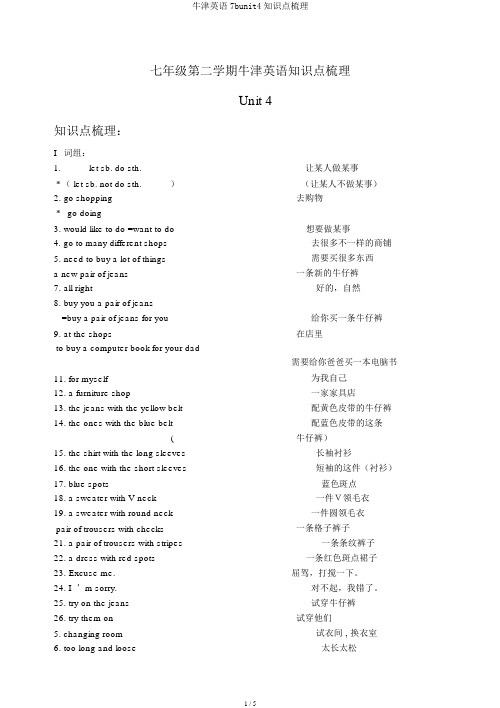
七年级第二学期牛津英语知识点梳理Unit 4知识点梳理:I词组:1.let sb. do sth.让某人做某事* ( let sb. not do sth.)(让某人不做某事)2. go shopping去购物*go doing3. would like to do =want to do想要做某事4. go to many different shops去很多不一样的商铺5. need to buy a lot of things需要买很多东西a new pair of jeans一条新的牛仔裤7. all right好的,自然8. buy you a pair of jeans=buy a pair of jeans for you给你买一条牛仔裤9. at the shops在店里to buy a computer book for your dad需要给你爸爸买一本电脑书11. for myself为我自己12. a furniture shop一家家具店13. the jeans with the yellow belt配黄色皮带的牛仔裤14. the ones with the blue belt配蓝色皮带的这条(牛仔裤)15. the shirt with the long sleeves长袖衬衫16. the one with the short sleeves短袖的这件(衬衫)17. blue spots蓝色斑点18. a sweater with V-neck一件V领毛衣19. a sweater with round neck一件圆领毛衣pair of trousers with checks一条格子裤子21. a pair of trousers with stripes一条条纹裤子22. a dress with red spots一条红色斑点裙子23. Excuse me.屈驾,打搅一下。
牛津英语模块七unit4知识点
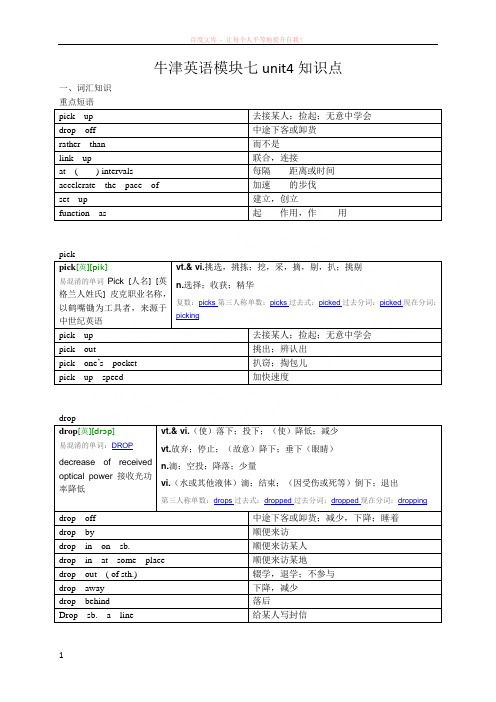
牛津英语模块七unit4知识点一、词汇知识重点短语pick up 去接某人;捡起;无意中学会drop off 中途下客或卸货rather than 而不是link up 联合,连接at (------) intervals 每隔------距离或时间accelerate the pace of 加速------的步伐set up 建立,创立function as 起------作用,作-------用pick[英][pik]易混淆的单词Pick[人名] [英格兰人姓氏] 皮克职业名称,以鹤嘴锄为工具者,来源于中世纪英语vt.& vi.挑选,挑拣;挖,采,摘,剔,扒;挑剔n.选择;收获;精华复数:picks第三人称单数:picks过去式:picked过去分词:picked现在分词:pickingpick up 去接某人;捡起;无意中学会pick out 挑出;辨认出pick one’s pocket 扒窃;掏包儿pick up speed 加快速度drop[英][drɔp]易混淆的单词:DROPdecrease of received optical power 接收光功率降低vt.& vi.(使)落下;投下;(使)降低;减少vt.放弃;停止;(故意)降下;垂下(眼睛)n.滴;空投;降落;少量vi.(水或其他液体)滴;结束;(因受伤或死等)倒下;退出第三人称单数:drops过去式:dropped过去分词:dropped现在分词:droppingdrop off 中途下客或卸货;减少,下降;睡着drop by 顺便来访drop in on sb. 顺便来访某人drop in at some place 顺便来访某地drop out ( of sth.) 辍学,退学;不参与drop away 下降,减少drop behind 落后Drop sb. a line 给某人写封信convey[英][kənˈvei]易混淆的单词:Convey [人名] 康维vt.传达,传递;运送,输送;[法]让与,转让(财产等);表达第三人称单数:conveys过去式:conveyed过去分词:conveyed现在分词:conveyingconvey sth. to sb. 向某人表达/传送某物convey sb. /sth. from A to B 把某人或某物从A地运送到B地convey one’s feelings / meanings /sorrow---- 表达某人的感情/意思/悲伤------convey transform transport三者间的区别convey:转达,通常是指不可见物质,如感觉,情绪,问候,信息等。
牛津模块七Unit 4 Public transport一轮复习资料
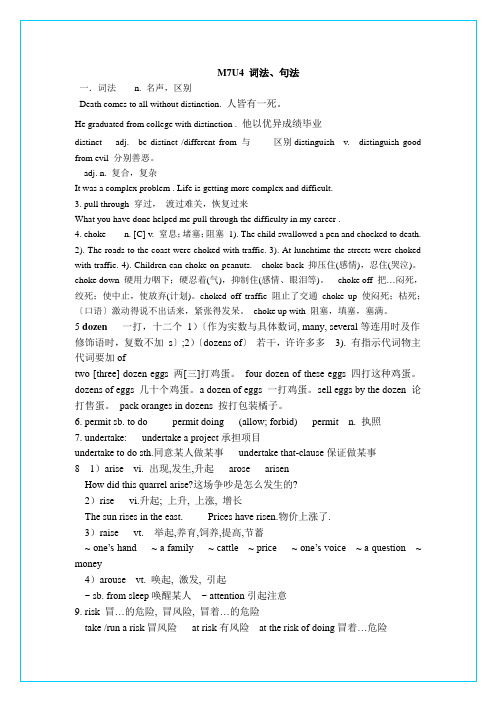
4)arouse vt.唤起,激发,引起
~ sb. from sleep唤醒某人~ attention引起注意
9. risk冒…的危险,冒风险,冒着…的危险
take /run a risk冒风险at risk有风险at the risk of doing冒着…危险
risk doing sth.冒着做某事的危险risk one’s life冒着生命危险
10. It is up to sb. to do sth.由某人负责做某事
11 aimn目标,目的,瞄准V目的是,旨在;瞄准,对准;力求达到,力争做到;针对
Be aimed at doing sth目的是,旨在be aimed to do sth力争做到
These measuresare aimed atpreventing violent crimes.
牛津高中英语模块七Unit_4
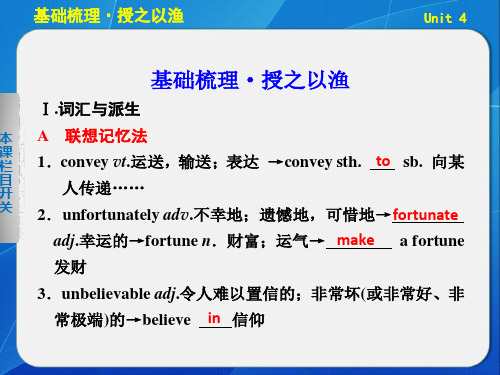
under construction 在建设中
Unit 4
基础梳理·授之以渔
Unit 4
学情自测
选词填空
decide on, have the authority to, fill in, put through,
本 link up
课 栏
1.The space shuttle will link up with the space station
holes leading to the surface at regular intervals,so that
people could get fresh air and would not choke.
基础梳理·授之以渔
Unit 4
3. Having seen the situation (看到这种情况),a wealthy American businessman , Charles Yerkes , undertook
课
栏
hood.
目 开
2.The little town of Stein-an-Rhein is an architectural
关
(architect) gem.
3.If you need anything, please ask at the reception
(receptionist) desk.
5.We’re still trying to decide on a venue.
基础梳理·授之以渔
Unit 4
Ⅲ.经典课文原句
1.However,most trains to London only went to the outer
本 课
牛津版7英 下册 Unit 4 知识集锦
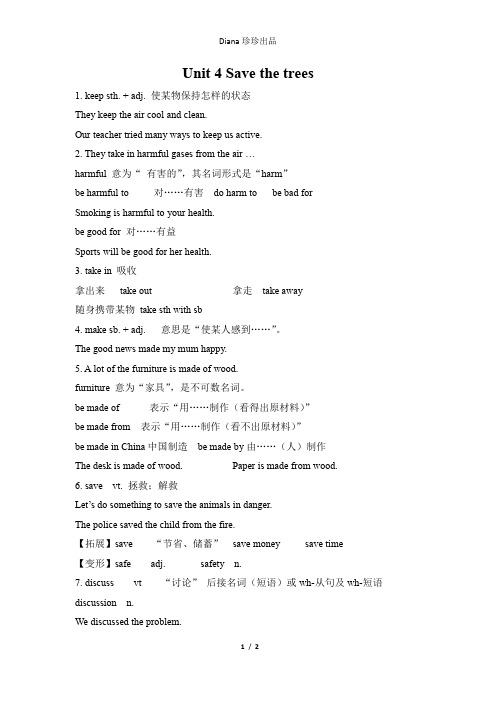
Unit 4 Save the trees1. keep sth. + adj. 使某物保持怎样的状态They keep the air cool and clean.Our teacher tried many ways to keep us active.2. They take in harmful gases from the air …harmful 意为“有害的”,其名词形式是“harm”be harmful to 对……有害do harm to be bad forSmoking is harmful to your health.be good for 对……有益Sports will be good for her health.3. take in 吸收拿出来take out 拿走take away随身携带某物take sth with sb4. make sb. + adj. 意思是“使某人感到……”。
The good news made my mum happy.5. A lot of the furniture is made of wood.furniture 意为“家具”,是不可数名词。
be made of 表示“用……制作(看得出原材料)”be made from 表示“用……制作(看不出原材料)”be made in China中国制造be made by由……(人)制作The desk is made of wood. Paper is made from wood.6. save vt. 拯救;解救Let’s do something to save the animals in danger.The police saved the child from the fire.【拓展】save “节省、储蓄”save money save time【变形】safe adj. safety n.7. discuss vt “讨论”后接名词(短语)或wh-从句及wh-短语discussion n.We discussed the problem.We will discuss who should do it.We will discuss what to teach next term.8. leaf n. “树叶”复数:leaves life生活复数:livesThe fall of one leaf is enough to tell the coming of autumn. 一叶知秋。
牛津初中英语7BUnit4知识点归纳(K12教育文档)

牛津初中英语7BUnit4知识点归纳(word版可编辑修改)编辑整理:尊敬的读者朋友们:这里是精品文档编辑中心,本文档内容是由我和我的同事精心编辑整理后发布的,发布之前我们对文中内容进行仔细校对,但是难免会有疏漏的地方,但是任然希望(牛津初中英语7BUnit4知识点归纳(word版可编辑修改))的内容能够给您的工作和学习带来便利。
同时也真诚的希望收到您的建议和反馈,这将是我们进步的源泉,前进的动力。
本文可编辑可修改,如果觉得对您有帮助请收藏以便随时查阅,最后祝您生活愉快业绩进步,以下为牛津初中英语7BUnit4知识点归纳(word版可编辑修改)的全部内容。
牛津初中英语7BUnit4知识点归纳重点短语及句型1.amazing things 令人惊奇的事物 be full of = be filled with 充满、装满2.bright light 明亮的灯 learn about some amazing things 学习一些令人惊奇的东西3.the bright light on the plane飞机上明亮的灯4。
come on 得啦、得了吧、过来/加油5。
be full of amazing things 充满令人惊奇的事物6.It takes( sb)some time to do sth 花费(某人)一段时间做某事It takes about three days to travel from Earth to the moon by rocket乘火箭从地球到月亮旅行花费大约三天7。
2。
72 metres tall/long/wide/deep. 2.72米高/长/宽/深How tall / long / wide / deep…?8。
at the same time 同时9.Fish sleep with their eyes open 。
鱼是睁着眼睛睡觉的10。
Elephants walk on tiptoe. 大象踮起脚趾走路walk on tiptoe / walk on foot 用脚趾走 / 步行11.There is no plant life without lightning =If there is no lightning ,there is no plant life 。
【个人手工制作】新牛津高中英语模块七第四单元知识点整理及单元练习
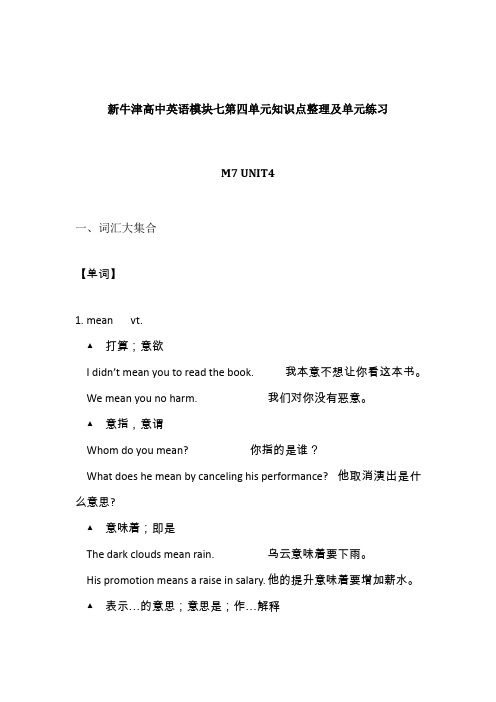
新牛津高中英语模块七第四单元知识点整理及单元练习M7 UNIT4一、词汇大集合【单词】1. mean vt.▲打算;意欲I didn’t mean you to read the book. 我本意不想让你看这本书。
We mean you no harm. 我们对你没有恶意。
▲意指,意谓Whom do you mean? 你指的是谁?What does he mean by canceling his performance? 他取消演出是什么意思?▲意味着;即是The dark clouds mean rain. 乌云意味着要下雨。
His promotion means a raise in salary. 他的提升意味着要增加薪水。
▲表示…的意思;意思是;作…解释What does this sentence mean? 这个句子什么意思?2. This sounds like my school in China.sound link v. “听起来”,常用结构:sound + adj./like/ (to sb) as if/as thoughHis explanation sounds reasonable.It sounds to me as if there is a tap running somewhere.听起来好象哪儿有水龙头在淌水。
The music sounds like wolve s’ crying.▲be/fall sound asleep 酣睡(sound是副词,酣畅地)▲ a sound night’s sleep 睡一夜好觉(sound是形容词,酣畅的,沉的)3. I found the homework was not as heavy as what I used to get in myold school, but it wasa bit challenging for me at first.a bit = a little = a little bit“稍微;有点”,修饰形容词或副词的原级或比较级。
牛津模块7 Unit4复习课件
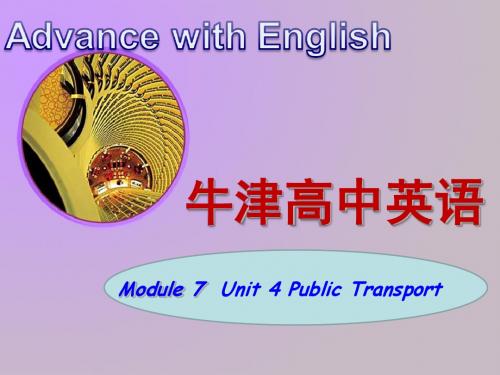
Check the understanding of some expressions 1. Dalian is linked to the national railway system. is connected to 2. A new service has speeded up travel between made… faster the two cities. 3. Part of the road is still under repair. being repaired 4. News flash: An urgent or immediate item of news. 5. A ferry: A boat used to transport people, vehicles, or goods across a body of water. 6. in addition to …: besides … 7. be punctual: be on time
permit
(permitting/ permitted)
+ ing form of verb
+ object + to infinitive
注意 区别: permit, allow, forbid permit, allow, forbid 都只可以用不定式作宾补,不可用不定 式作宾语,即permit/allow/forbid sb to do sth;而往往可以用 名词、代词或动名词作宾语即permit/allow/forbid doing sth. permit 作名词用时,表“许可,认可,准许” 常用搭配 允许某人做某事 permit/allow sb to do sth permit/allow doing sth 允许做某事 在某人的许可下 with sb’s permission 未经(某人的)许可 Without (sb’s) permission =with the permission of sb
牛津高中英语模块七Unit4 Vocabulary(Welcome-Grammar)(共27张)
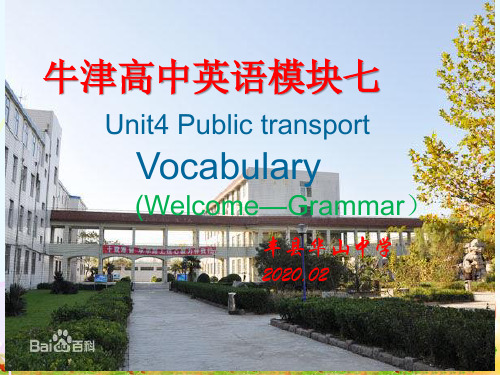
②The police are following several lines of enquiry. 探索
③Det Supt Bassett was in charge of the murder enquiry. 调查
13 fill in 填写;消磨时光;填满,塞满 ①He filled in the rest of the day watching TV.
牛津高中英语模块七
Unit4 Public transport
Vocabulary
(Welcome—Grammar)
丰县华山中学 2020.02
1. convey vt. 运送;运输;传递,表达
常见搭配
convey sth. to sp.把某物运送到某地
convey sth. to sb. 把某事传达给某人
convey that
传达……
①They built a new subway to convey a great
number of passengers to the downtown.
他们建了一条新的地铁把大量乘客运送到市区。
②Words can not convey my feelings. 言语无法表达我的心情。
be filled with (=be full of) 充满; 装满; 充满着; On a clear night, the sky appears to be filled with stars. 在晴朗的夜晚,天空中布满了恒星。
14.split(split,split) vi vt 分割,(使)分开;撕开, 割破 1)Her dress had split along the seam(接缝).
她的连衣裙顺着接缝裂开了。
牛津高中英语模块七第四单元阅读课文语言点讲解

2. distant [adj.] far away
in the distant past/future: far away in the past or future: distance [n.]距离
He travels quite a distance (= a long way) to work every day. Does she live within walking distance of her parents?
You have been sitting on my hat
and now it is badly out of ___B___.
(2006广东)
A. date
B. shape
C. order
D. balance
12. discount: 折扣
1.如果你购买多份,他们经常给你打折。 They usually give you a discount if
3. They linked up two areas by telephone.
用法拓展:be connected with 与……相接, 和……有联系
5. place: [v.] 放置,置于(Line 36) 1) 她把录音机放在她前面的桌上。
She placed a tape recorder in front of her on the table. 2)他的不合作态度使我们处于尴尬的处境. His uncooperative attitude placed us in an embarrassing situation. 3) This job places great demands on the workers, which can be quite stressful.
苏教牛津译林高中英语模块7_第四单元Reading语言点精讲
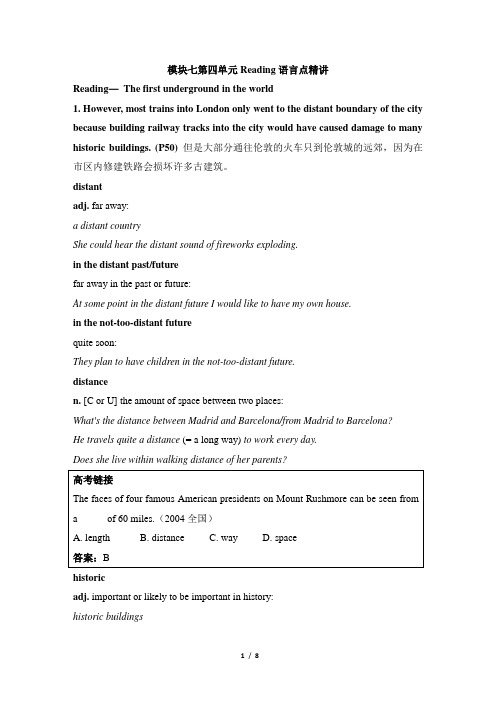
模块七第四单元Reading语言点精讲Reading—The first underground in the world1. However, most trains into London only went to the distant boundary of the city because building railway tracks into the city would have caused damage to many historic buildings. (P50) 但是大部分通往伦敦的火车只到伦敦城的远郊,因为在市区内修建铁路会损坏许多古建筑。
distantadj. far away:a distant countryShe could hear the distant sound of fireworks exploding.in the distant past/futurefar away in the past or future:At some point in the distant future I would like to have my own house.in the not-too-distant futurequite soon:They plan to have children in the not-too-distant future.distancen. [C or U]the amount of space between two places:What's the distance between Madrid and Barcelona/from Madrid to Barcelona?He travels quite a distance (= a long way) to work every day.Does she live within walking distance of her parents?historicadj. important or likely to be important in history:historic buildingsa historic day/momentIn a historic vote, the Church of England decided to allow women to become priests. historicaladj. connected with the study or representation of things from the past:Many important historical documents were destroyed when the library was bombed. She specializes in historical novels set in eighteenth-century England.historicallyadv.The film makes no attempt to be historically accurate.Historically (= Over a long period in the past), there have always been close links between France and Scotland.2. Unfortunately, the increased number of vehicles on the road choked off traffic, and the road became so busy that no one could travel anywhere. (P50) 不幸的是马路上增加的车辆把道路堵得水泄不通,交通变得如此拥挤以致于每个人都寸步难行。
牛津高中英语Module7 Unit4 单词讲解 课件 (共21张PPT)

Dogs are not permitted in the building. I’ll come tomorrow, weather permitting. You cannot enter a military base without a permit.
sightseeing n. sightseer n.
aim v. ~sth. at sth./sb. He aimed his gun at the target, fired and missed it. He has always aimed high. 他总是志气很高。
My remarks were not aimed at you. aim at doing sth.=try to do sth. We must aim at increasing/to increase exports. My aim was accurate. He has only one aim in life-to become rich
He became a top sportsman at some sacrifice to himself. He parents made many sacrifices so that she could go to university.
assign sth. to sb. The teacher has assigned each of us a holiday task. They’ve assigned their best man to the job.
tire of sth. /doing sth. After a week, I tired of eating fish. tired adj. tired out=completely exhausted tiring adj. a tiring journey
- 1、下载文档前请自行甄别文档内容的完整性,平台不提供额外的编辑、内容补充、找答案等附加服务。
- 2、"仅部分预览"的文档,不可在线预览部分如存在完整性等问题,可反馈申请退款(可完整预览的文档不适用该条件!)。
- 3、如文档侵犯您的权益,请联系客服反馈,我们会尽快为您处理(人工客服工作时间:9:00-18:30)。
Unit 4 Public transportWelcome to the unitphr v to begin to sleepShe kept dropping off at her desk.I must have dropped off to sleep .drop sb/sth⇔offto take someone or something to a place by car and leave them there on your way to another placeI'll drop you off on my way home.to fall to a lower level or amountThe number of graduates going into teaching has dropped off sharply.Reading2.Because it linked with other lines at almostevery station, making the system moreuser-friendly.3.He is the architect that designed many of thestations between 1918 and 1938. Many of therailway tracks did not go into theLondon city centre, so buses were required.This increased traffic on the road. Theunderground system transported morepeople without increasing traffic on theroad.2.The carriages did not have windows andwere pulled by steam engines throughnarrow tunnels.3.He bought many of the different lines andset up the Underground Group.4.It has functioned as a bomb shelter, anaeroplane factory, anti-aircraft centre,meeting rooms for the governmentadministration.5.More lines were added because morepeople traveled on the underground.6.It means that many of the lines are linkedat many stations. Therefore, it is veryconvenient for riders to go to differentplaces in the city from any station.Event1854 An underground railway was decided to be built1863 The first tunnels were opened1868 The next section of the underground system was opened1884 The underground service was provided in the middle of the city1933 A public organization was created1918-1938 London transport was expandedAfter 1945 More people traveled on the underground and more lines were added1977 The last line was addedadj. far awayin the distant past/future: far away in the past or future:distance n. [C or U] the amount of space between two places:He travels quite a distance (= a long way) to work every day.Does she live within walking distance of her parents?1.boundaryn. -- the edge (Line5)The mountain becomes the national ~ for both countries.The fence serves as a ~ between the two buildings.the boundaries of knowledge2.historicadj. -- having importance in or influence on history (Line 6)11 November 1918 is a ~ day as it represents the end of World War I.Can you tell me when the ~ meeting between the two great leaders was held?Historic refers to what is important in history:the historic first voyage to outer spaceIt is also used of what is famous or interesting because of its association with persons or events in history:a historic houseHistorical refers to whatever existed in the past, whether regarded as important or not:a historical characterHistorical refers also to anything concerned with history or the study of the past:a historical novelhistorical discoveriesThe differentiation between the words is not complete. They are often used interchangeably: historic times or historical times3.choke (Line8)n. [C] v. 窒息;堵塞;阻塞1). The child swallowed a pen and chocked to death.2). The roads to the coast were choked with traffic.3). At lunchtime the streets were choked with traffic.4). Children can choke on peanuts.引申: chock back 忍住,抑制chock up 因激动等说不出话来4.link (Line21)v. [T] to make a connection between two or more people, things or ideas:1) The explosions are not thought to be linked in any way.•link up: to form a connection, especially in order to work or operate together:2)The organization's aim is to link up people from all over the country who are suffering fromthe disease.3)They linked up two areas by telephone.用法拓展:be connected with 与……相接,和……有联系5.place (Line 36)v. --to be in a state or situation1) She placed a tape recorder in front of her on the table.2) His uncooperative attitude placed us in an embarrassing situation.3) This job places great demands on the workers, which can be quite stressful.6.be responsible for (L39)be in charge of1)The driver is responsible for the passengers’ safety.2) Philip is the project manager. He is responsible for anything concerning the project.3) Who is responsible for making the dinner reservation?7.function as (L42)serve as1) My living room also functions as a study.2) The room functioned as a store room for keeping all our collection.3) The beautiful leaf functioned as a bookmark8.honor (L51)a quality that combines respect, pride and honesty:a man of honorWe fought for the honor of our country.n. [C] a reward, prize or title that publicly expresses admiration or respect:She received an honor for her services to the community.in honor of sb./ sth. in order to celebrate or show great respect for someone or sth.:a banquet in honor of the president9.permit (L57)v. -tt- [T] to allow sth.:The regulations do not permit much flexibility.[+do ing] The prison authorities permit visiting only once a month.[+ object + to infinitive] The security system will not permit you to enter without the correct password.10.beneathpreposition (formal)in or to a lower position than sb/sth; under sb/sth:They found the body buried beneath a pile of leaves. ◆The boat sank beneath the waves.not good enough for sb: He considers such jobs beneath him.◆They thought she had married beneath her (= married a man of lower social status).UNDERbeneath adverb: Her careful make-up hid the signs of age beneath.11.ordern. [U] 顺序in order of: 以……的顺序out of order:杂乱无序The children lined up in order of age/height.I can't find the file I need because they're all out of order (= they are no longer arranged in the correct way).Put the files in alphabetical order.12.discountn. [C] a reduction in the usual price:折扣They usually give you a discount if you buy multiple copies.They offer a 10 percent discount on rail travel for students.at a discount(a) at a reduced price 打折扣; 减价.(b) (fig 比喻) not highly valued; unfashionable 不受重视的; 不时兴的:Concern for others seems to be at (something of) a discount today. 如今好像不兴关心别人了.Word PowerLanguage Points1.rely on sb./sth.1) 依靠,依赖[+ ing form of verb] The success of this project relies on everyone making an effort.[+ to infinitive] I'm relying on the garage to fix the car by tomorrow.2) to trust someone or sth. or to expect them to behave in a particular way指望,期待British weather can never be relied on - it's always changing.[+ ing form of verb] Don't rely on finding me here when you get back (= I might have gone).I. 分词的构成分词分为现在分词和过去分词。
